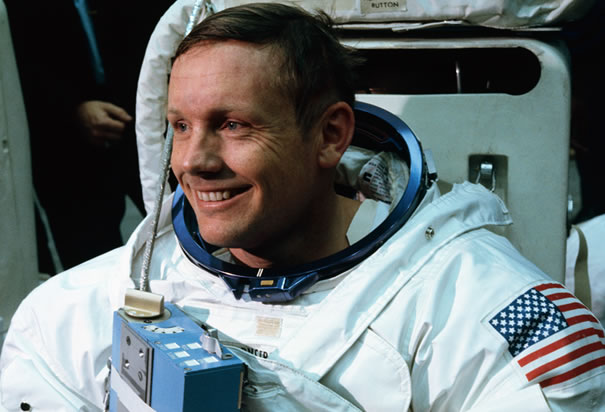Neil Armstrong has died. He was a native Ohioan, a fine fighter pilot, a Korean War veteran, a successful businessman — but he will forever be remembered as the first man to set foot on the Moon.
 On July 20, 1969, millions of people around the world watched with hope and anticipation as Armstrong backed down the ladder of the Eagle landing craft, moving slowly in his bulky white space suit adorned with an American flag. When he finally put his boot print on the lunar surface — and made his famous, crackly statement, “That’s one small step for man . . . one giant leap for mankind” — every American felt a huge rush of national pride.
On July 20, 1969, millions of people around the world watched with hope and anticipation as Armstrong backed down the ladder of the Eagle landing craft, moving slowly in his bulky white space suit adorned with an American flag. When he finally put his boot print on the lunar surface — and made his famous, crackly statement, “That’s one small step for man . . . one giant leap for mankind” — every American felt a huge rush of national pride.
It was a magnificent achievement, and Armstrong’s humble, moving words captured the moment, and the emotions, perfectly. Those of us who watched that grainy broadcast live will never forget it. The fact that Armstrong was an Ohioan just made the moment a little sweeter.
 Neil Armstrong’s legacy cannot be separated from Apollo 11, its historic lunar landing, and the boot print he left on the Moon’s dusty surface, but he was an interesting, and estimable, person for other reasons. A private person, Armstrong never tried to cash in on his fame or take advantage of the circumstances that made him the first man on the Moon. When he returned from the lunar surface he worked for NASA, taught engineering at the University of Cincinnati, served on corporate boards and investigatory commissions, and spoke out in favor of space exploration — and he did it all without fanfare.
Neil Armstrong’s legacy cannot be separated from Apollo 11, its historic lunar landing, and the boot print he left on the Moon’s dusty surface, but he was an interesting, and estimable, person for other reasons. A private person, Armstrong never tried to cash in on his fame or take advantage of the circumstances that made him the first man on the Moon. When he returned from the lunar surface he worked for NASA, taught engineering at the University of Cincinnati, served on corporate boards and investigatory commissions, and spoke out in favor of space exploration — and he did it all without fanfare.
Neil Armstrong was 82. He will be missed.

 President Obama had better hope voters don’t ask themselves that question this year, because new economic data analyzed by former Census Department statisticians at the Sentier Research firm reveals that
President Obama had better hope voters don’t ask themselves that question this year, because new economic data analyzed by former Census Department statisticians at the Sentier Research firm reveals that Obviously, Presidents must be self-confident to be successful. It’s a demanding job; the individual who fills it has to be decisive, and a big part of being decisive is having confidence in your judgment. You don’t want someone who is wringing their hands about every decision. That’s one reason why people were so concerned about
Obviously, Presidents must be self-confident to be successful. It’s a demanding job; the individual who fills it has to be decisive, and a big part of being decisive is having confidence in your judgment. You don’t want someone who is wringing their hands about every decision. That’s one reason why people were so concerned about 